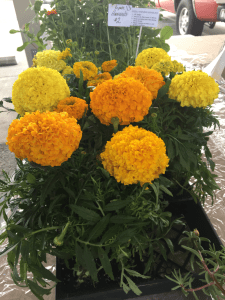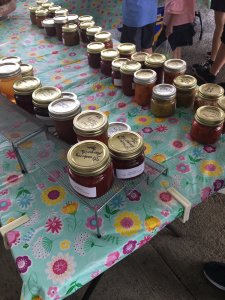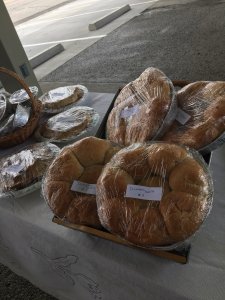KANSAS CITY, Mo. — After months of flooding in the Midwest, farmers have a tough year ahead of them to grow, harvest, and sell crops. Flooding levels haven’t been seen this high in Missouri and Kansas since the 1990s. The problems with flooding this year come at the same time the United States Department of Agriculture announced it will move its core operations from Washington D.C. to Kansas City. Employees turned their backs June 13, 2019 in a silent protest during the announcement — they’re concerned a push away from D.C. will put less focus nationally on agricultural needs and studies on climate change, which the agency conducts some of that research.
Now more than ever the Kansas City metro has a hand on the fate of America’s agricultural needs – and to ascertain this goes in a positive direction, consumers and voters need to step up their education on what ends up on the table. Now is the time to head to farmers markets, make real connections with farmers, to support farmer needs, and to read up on the latest when it comes to food, the soil, and everything related to agronomy. (Scroll to the bottom of the article for a list of popular farmers markets in our area to learn more and help local vendors.)
The Kansas City metro has a large number of regularly operating farmers markets. A variety of farmers need support at this time for different reasons, and buying locally can help sustain the economy. The spring flooding season has set several crops behind schedule, so price will likely go up. The latest info from the USDA on June 10 reports the Show Me State is about 20% short of its normal corn crop for this time of year. Meanwhile, the National Agricultural Statistics Service reported earlier in June that sorghum planting has run late with only 25% planted. That is about half of what farmers normally plant by this time. 48% of the state’s soybeans have also been planted. Usually by late spring Kansas farmers already have 69% of the soybean crop seeded (soybeans are not an edible crop). Kansas’ wheat crop has also developed slowly; only 2% of the crop has matured. Normally 25% of wheat crop has matured by this time.

Supporting Farmers Markets and the Local Communities
Farmers markets sell foods directly by farmers to consumers. Depending on the style of the market, food and other items could be sold indoors or outdoors. Markets will have booths, tables, or stands where farmers sell homegrown produce, live animals, plants, and sometimes prepared foods and beverages. These exchanges exist in countries worldwide and reflect the local culture and economy. Crops native to Missouri include: corn, cotton, hay, wheat, apples, peaches, grapes, watermelons, a wide variety of vegetables and potatoes. Crops native to Kansas include: wheat, corn, soybean, hay, cotton, broom-corn, tobacco, grapes, squash, beans, pumpkins, and sunflowers.
Farmers markets generally help farmers earn an increased profit over selling to wholesalers, food processors, or large grocery firms. By selling directly to customers, produce often needs less transport, less handling, less refrigeration, less preservatives, and less time in storage. This helps food stay organic and helps keep a proper shelf life for items. At an outdoor market, the cost of land, buildings, lighting, and air-conditioning is generally reduced or eliminated. Farmers may sell the excess items to canneries and other food-processing firms, which tends to net a better profit than selling items to larger operations. At the market, farmers can retain the full premium for part of their produce, instead of only a processor’s wholesale price for the entire lot.

Some farmers prefer the simplicity, immediacy, transparency, and independence of selling products directly to consumers. It’s also easier to answer questions, to discuss methods used to produce the item, and to help customers pick out the best fruit of the bunch. One method noted by the special interest group Food Empowerment Project promotes community-supported agriculture programs (CSAs). In this arrangement, consumers pay farms seasonally or monthly to receive weekly or biweekly produce boxes.
Farmers Markets and the Benefits to Communities
- Farmers markets maintain and strengthen social ties.
- It links rural and urban populations and connects neighbors or neighborhoods in a mutually rewarding exchange.
- Farmers markets generate traffic, which is positive for nearby stores, restaurants, and other businesses.
- Serves as a strong place for community events and announcements.
- Buying at markets brings attention to the surrounding area; it helps with building more rounded perspectives in the community.
- By providing an outlet for ‘local’ products, farmers markets help put a spotlight on unique crops or items within the area. This encourages positive pride in the community. For instance in Kansas, sunflowers are an important symbol of the state.
- Reduced transportation equals less of a carbon footprint.
- Lower refrigeration energy costs.
- Lower transport pollution.
- Less land dedicated to food storage.
Farmers markets strengthen civic engagement by reducing the social distances between urban and rural communities. With fewer intermediaries, the support of independent and local growers can enhance the local economy. Farmers markets also tend to give poorer communities opportunities to have their health and wellness checked or to learn more about nutrition.
Benefits to Consumers
- Reduced overhead: driving, parking, traffic costs, and lower prices.
- Often fresher foods than found at larger stores.
- Seasonal foods.
- Healthier foods with less preservatives.
- A better variety of foods, such as : organic foods, pasture-raised meats, free-range eggs and poultry, handmade farmstead cheeses, heritage breeds of meat, jams, and plants.
- A place to meet neighbors, socialize, and make new connections.
- Time spent outside and recreational activity from walking.
Prices at a farmers market are often lower than prices at a supermarket because the process of production is more succinct — there is less distance to travel and fewer go-between agents. Consumers should wash all products before consumption whether those items were purchased at a farmers market or at a grocery store. Follow recall alerts before shopping to prevent sickness from salmonella, listeria, and other illnesses.
Regulations at Missouri and Kansas Farmers Markets
Approximately 240 farmers markets now operate in the state of Missouri. The Missouri Department of Agriculture reports a boom in farmers markets’ requests over the past decade.
Studies from Iowa State University, the New Economics Foundation, and the Project for Public Spaces independently showed ways that farmers markets provide positive local economic activity, such as bringing in support to other nearby businesses.
The Missouri Grown Farmers’ Market Handbook is a comprehensive resource for Missouri farmers market managers and vendors. It is a guide to creating markets, sustaining them, and following rules to ensure the safety of farmers and consumers. The handbook is not a final authority on food safety rules and regulations in the state of Missouri. Food and agricultural matters can also be taken up by other agencies. For instance, the Missouri Department of Health and Senior Services and local health departments are primarily responsible for the regulatory oversight of food safety at farmer markets. Depending on the type of food or other products, other agencies may be involved. The Food and Drug Administration (FDA) or the United States Department of Agriculture (USDA) may have some regulatory oversight.
The authority of the Missouri Department of Agriculture includes scales, sale of eggs, sale of live plants and animals, sale of dairy products, sale of pet treats, and the sale of meat and poultry products. The Missouri Department of Agriculture does not regulate the terms of the farmers markets nor the operation of them, but a market must register with the department yearly.

Food Sales at Farmers Markets in Kansas
The Kansas Department of Agriculture regulates retail food sales. The goal is to ascertain all foods offered for purchase are safe and wholesome for consumption or other use.
The sale of non-potentially hazardous foods that do not require temperature control are allowed at farmers markets and similar exchanges without a food establishment license. Non-potentially hazardous foods include: baked goods, such as cookies, scones, brownies, breads, cakes, cinnamon rolls, and fruit pies. Other non-potentially hazardous foods include: fresh fruits, vegetables, nuts, and honey.
- Kansas allows home-grown produce to be sold, but it must comply with pesticide rules and with label directions. KDA recommends following Good Agricultural Practices. More information is available here.
- All packaged products must be labeled. Common names should be used on products. The label must include the name and address of the producer.
- Ready-to-eat, potentially hazardous foods must be sold from a vendor operating in compliance with all KDA regulations.
- The sale of potentially hazardous foods is prohibited without a food establishment license.
- Kansas prohibits home-canned products with the exception of traditional jams and jellies.
- All foods on sale or display must follow rules to prevent contamination.
The sale of potentially hazardous foods is restricted to protect the public from foodborne illness. Potentially perilous foods include: milk products, eggs, meat, poultry, fish, sprouts, cut leafy greens, heat treated vegetables, heat treated starches, and cut produce. Examples include:
- Pies with cream or meringue
- Cheesecake
- Custards
- Cream filled cupcakes, donuts, or similar items
- Hamburgers and hot dogs
- Burritos
- Egg rolls
- Jerky and lean trimmed meat
- Summer sausage or similar products
- Cut melons
- Canned vegetables
- Alfalfa sprouts
- Cut or torn lettuce
- Cut tomatoes
Some of the more Popular Farmers Markets in the Kansas City Metro
City Market, Kansas City, MO: Located in the River Market where casual eateries, gourmet grocery stores, and boutiques make for an enriched food shopping experience. The City Market has a rich history dating back to 1857. It started as a site for commerce, horse trading, political rallies, revivals, medicine shows, and circuses. You can get a better idea of life during the westward expansion with a tour of the Arabia Steamboat Museum, home of the largest single collection of pre-Civil War artifacts in the world. Dogs and other animals are not allowed in City Market shops, restaurants, walkways, or common areas including the Farmers Market. Animals serving in an official ADA role are allowed on City Market property. In regards to animals, this is the general rule of thumb for most farmers markets to protect foods and other items.
City Market has two produce dealers, Global Produce & Cristina’s Produce located on the west side of City Market. They sell items usually found at typical groceries at lower prices. Some of the inventory is locally-grown and seasonally driven. The market also receives items from national and international providers. City Market hosts the region’s largest Farmers Market on Saturdays and Sundays. City Market shops and restaurants accept credit and debit cards. Some shops are cash-only.
Broad paths for strolling and biking trace the shoreline in Berkley Riverfront Park.

Rosedale Farmers Market in Kansas City, KS: It started in 2009 as a collaboration between church and community gardens. The market includes bakers, jam-and-sauce-makers, and craft makers. The goal of the market is to bring fresh, affordable, and healthy food to the Rosedale neighborhood. The market opens every Sunday from mid-May to the end of September between 10:00am to 2:00pm. Early in the season farmers sell lettuce, spinach, kale, potatoes, green onions, asparagus, strawberries, breads, cookies, and pies.
Brookside Farmers Market in Kansas City, MO: All vendors are farmers and makers. Those who grow food directly sell it to the customer. Everything sources from within 100 miles of Kansas City. The market operates year round with an indoor Winter Market. It features locally sustainable products, produce, meat, baked goods, and handcrafted items. It is governed by an all-volunteer, vendor-led board of directors. The Brookside Farmers Market encourages cooking from scratch from real ingredients. Brookside Farmers’ Market began in 2003 by a group of local farmers dedicated to sustainable practices.
Overland Park Farmers Market: The market has operated for 35 years. Vendors provide farm-to-table food at the Downtown Overland Park Farmers Market. Vendors offer customers fresh produce, local foods, and unique items. Dogs and pets other than service animals are not allowed on the site. Saturday markets run from 7:00am to 1:00pm, April 20 through September 22. It will run from 8:00am to Noon, September 28 through November 16. Wednesday markets run from 7:30am to 1:00pm, May 22 to September 25. At this time Overland Park is studying possible options for improvements and expansion of the market.
Farmers Market in Lawrence: This is the largest and oldest farmers market in Kansas. Local growers and farm producers offer a wide range of products and produce. Customers will find fresh fruits, veggies, baked goods, herbs, and homemade condiments. The Lawrence Farmers Market encourages consumers to buy products from small, local farms. It also intends to educate the public on farming and food practices. The market intends to improve access to local, healthy, and affordable food through direct farm-to-consumer marketing. The farm intends to serve diverse populations, including those of low income. LFM is a producer based market. A vendor must directly produce the majority of items offered on land the vendor owns, leases, or sharecrops. A vendor may not purchase from wholesalers to resell at the Lawrence Farmers Market.
Merriam Farmers Market: It includes entertainment, activities, and food trucks. The market is located in downtown Merriam historic district.
Mission Farmers Market: It opens every Thursday through August 29, 2019. The market hours are 4:30pm to 8:00pm. Four times this summer the market will host more than the usual number of food trucks with live music entertainment. Those dates are: June 20, July 18, August 15, and September 19. The market is held on the grassy area on Johnson Drive between Reeds and Maple, one block west of the Capitol Federal on Nail Avenue at 5635 Johnson Drive.
Independence Uptown Market: The market is located on the Historic Independence Square at 211 W. Truman. It is held seasonally May to October each Wednesday and Saturday. During the winter months, the space is heated. The facility is also used for special events and a variety of programs.
Kansas City Organics: Organic family farmers offer fresh picked, locally grown produce, meats, honey, edible flowers, herbs, grains, breads, and pies. Vendors also sell bar soaps, body care items, handmade cards, wood crafts, and candles.
Lenexa Farmers Market: Vendors serve fresh veggies, fruits, eggs, baked goods, flowers, and more. Each Saturday and Tuesday during the market season, all products are required to be sourced within 250 miles of Lenexa. The Lenexa Farmers Market is located on the bottom floor of the parking garage of the Lenexa Civic Campus. Free parking is available on the upper floors of the parking garage.
Olathe Farmers Market: It runs April through October. The farmers market offers a variety of baked goods, flowers, fresh produce, plants, and more. Most items are produced regionally within 250 miles of Olathe. Vendors accept cash, only some will accept credit or debit cards. The market runs on Wednesdays and Saturdays from 7:30am until items are sold. Locations: Stagecoach Park, 1205 E. Kansas City Road and Black Bob Park, 14500 W. 151st St., Field One.
Parkville Farmers Market: The market offers a wide selection of locally grown produce, farm fresh eggs, honey, jams, jellies, meats, homemade baked breads, and sweet treats. You can also find flowers, herbs, mushrooms, and other plants.
Gardner Farmer Market: The market offers a wide assortment of produce and other items. Operating hours are May 23 through September 12 from 4:00pm to 7:00pm.
Where the Red Fearn Grows: Where the Redfearn Grows Natural Farms CSA program allows you to take home your share of the harvest each week. The farm has grown produce since 2009. It is located in Independence. The farm-to-table hotspot serves the Kansas City metro area. It utilizes year-round production strategies to provide the community with green, fresh, locally grown produce.
Atchison Farmers Market: Founded in 1998, growers from Atchison and surrounding counties provide fresh, locally produced vegetables and fruits at the market. There are also vendors selling locally raised meat and plenty of bakers and jelly and jam makers.
Pony Express Farmers Market, St. Joseph, MO: The market offers locally grown fresh fruits and veggies, cut flowers, bedding plants, container gardens, fresh farm eggs, baked goods, honey, pork, lamb, barbecue, Mexican foods, homemade soaps, and handmade crafts. The market operates every Wednesday and Saturday from 7:00am to 1:00pm or at sell out from Mid-April until the last Saturday in October. The market is located in the East Hills Mall Parking Lot off Woodbine (behind Dillard’s and Sears). The winter market operates from November until Mid-April and is located in the East Ridge Village Complex at Frederick Ave. & Village Dr.
